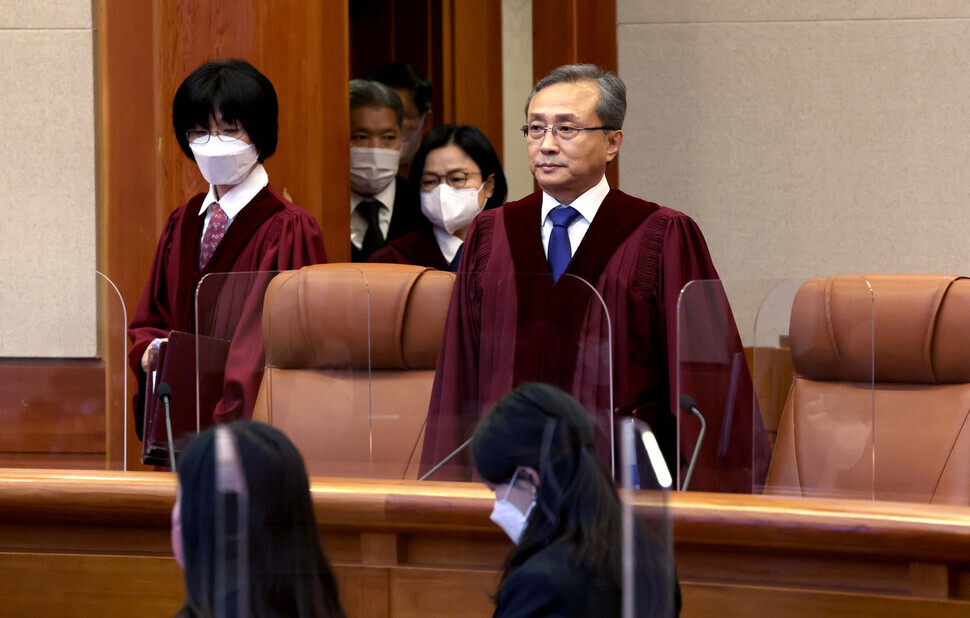hankyoreh
Links to other country sites 다른 나라 사이트 링크
[Editorial] Justice Ministry must take court’s ruling on prosecutor reforms to heart

South Korea’s Constitutional Court ruled Thursday that a revision of the Prosecutors’ Office Act that was enacted last year to reduce the investigative authority of the prosecution service does not violate prosecutors’ constitutional prerogatives.
The revised act, which was part of an ongoing push to reform Korea’s prosecution service, has faced serious pushback from prosecutors and was in danger of being nullified by an “enforcement decree coup” carried out by President Yoon Suk-yeol, himself a former prosecutor. But the Constitutional Court’s decision means the act will remain in force.
This was the right decision considering that deflating the prosecutors’ bloated powers is an essential step toward prosecutorial reform.
The Constitutional Court dismissed a petition filed by Justice Minister Han Dong-hoon and several prosecutors, with five justices in the majority and four dissenting. A dismissal means the court deemed the lawsuit inappropriate and didn’t bother to hear the evidence.
The court concluded that prosecutors’ authority over investigations and indictments is not guaranteed by the Constitution. That means the National Assembly can use legislation to make whatever adjustments it deems necessary in those areas.
The key contention in this lawsuit was whether the prosecutors’ investigative authority was grounded in the Constitution. Han Dong-hoon argued that since prosecutors’ authority to request warrants is guaranteed in the Constitution, their authority to conduct investigations must be as well.
But a majority of justices regarded that as a sophistic argument. The court said that the authority to request warrants “was added to the Constitution to control for the possibility of [law enforcement] overusing force in investigations,” which did not serve as grounds for treating the prosecutors’ investigative authority as being inviolable.
Following his appointment last year, Han adjusted the enforcement decree to greatly expand the scope of prosecutorial investigations. While the revised law had limited the prosecutors’ investigations to the two areas of corruption and economic crimes, Han’s changes opened up those investigations to basically include all kinds of corruption.
But since the Constitutional Court’s ruling upholds the revised Prosecutors’ Office Act, the government ought to update the enforcement decree to comply with the spirit of the law.
To be sure, that’s unlikely to happen given Han’s obvious attitude toward prosecutorial reform. Indeed, Han expressed strong regret about the court’s decision, which he is “disciplined to agree with.”
Nevertheless, Han ought to bear in mind that the Constitutional Court threw the petition out without even judging it on its merits. In fact, some regard Han’s petition itself as a challenge to the National Assembly’s legislative authority and as an incitement to political strife.
Could such a petition even have been filed under an administration that was not so beholden to the prosecution service as this one is?
Korea’s public prosecutors have held immense power to constrain people’s rights. Placing democratic controls over the prosecution service is essential for protecting those rights.
Prosecutors ought to bear in mind that prosecutorial reform retains a great deal of public support even after Yoon and his allies in the prosecution service came to power.
Please direct questions or comments to [english@hani.co.kr]

Editorial・opinion
![[Column] Season 2 of special prosecutor probe may be coming to Korea soon [Column] Season 2 of special prosecutor probe may be coming to Korea soon](https://flexible.img.hani.co.kr/flexible/normal/500/300/imgdb/original/2024/0426/3317141030699447.jpg) [Column] Season 2 of special prosecutor probe may be coming to Korea soon
[Column] Season 2 of special prosecutor probe may be coming to Korea soon![[Column] Park Geun-hye déjà vu in Yoon Suk-yeol [Column] Park Geun-hye déjà vu in Yoon Suk-yeol](https://flexible.img.hani.co.kr/flexible/normal/500/300/imgdb/original/2024/0424/651713945113788.jpg) [Column] Park Geun-hye déjà vu in Yoon Suk-yeol
[Column] Park Geun-hye déjà vu in Yoon Suk-yeol- [Editorial] New weight of N. Korea’s nuclear threats makes dialogue all the more urgent
- [Guest essay] The real reason Korea’s new right wants to dub Rhee a founding father
- [Column] ‘Choson’: Is it time we start referring to N. Korea in its own terms?
- [Editorial] Japan’s rewriting of history with Korea has gone too far
- [Column] The president’s questionable capacity for dialogue
- [Column] Are chaebol firms just pizza pies for families to divvy up as they please?
- [Column] Has Korea, too, crossed the Rubicon on China?
- [Correspondent’s column] In Japan’s alliance with US, echoes of its past alliances with UK
Most viewed articles
- 1No good, very bad game for Korea puts it out of Olympics for first time since 1988
- 2[Column] Season 2 of special prosecutor probe may be coming to Korea soon
- 3Korea’s 1.3% growth in Q1 signals ‘textbook’ return to growth, says government
- 4‘We must say no’: Seoul defense chief on Korean, USFK involvement in hypothetical Taiwan crisis
- 5Is N. Korea threatening to test nukes in response to possible new US-led sanctions body?
- 6Division commander ordered troops to enter raging flood waters before Marine died, survivor says
- 7[Column] ‘Choson’: Is it time we start referring to N. Korea in its own terms?
- 8Will NewJeans end up collateral damage in internal feud at K-pop juggernaut Hybe?
- 9Korea sees more deaths than births for 52nd consecutive month in February
- 10[Editorial] Korea’s surprise Q1 growth requires objective assessment, not blind fanfare